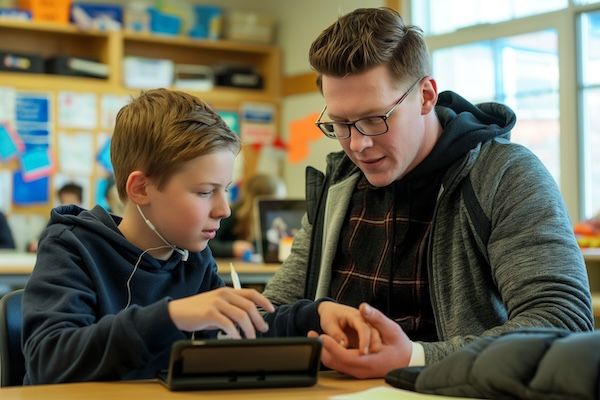
This blog was updated Oct. 29, 2025
ICYMI:
Last year, the US Department of Justice (DOJ) Civil Rights Division updated the Americans with Disabilities Act (ADA) to include new requirements for any government web content or apps, including all public education institutions such as K-12 districts, state departments of education, and public colleges and universities. The update requires government websites and their web apps and tools to be accessible to all, following the W3C’s WCAG 2.1 AA Standard. The time given for compliance is based on the size of the organization as to whether the required changes by April 2026 versus April 2027. K12 district and state education department numbers are based on census data, and for higher education, the dates are based on the population each institution serves. This also trickles down to those edtech providers that provide apps and tools to those institutions. Time is of the essence and there are only a few months left to get ready!
We Love Accessibility
At 1EdTech, we believe accessibility standards work best when they’re integrated into design and development from the very beginning. Considering accessibility early ensures it becomes a core part of design, helping create an inclusive edtech ecosystem.
To make it easier to include accessibility at the beginning of the process, 1EdTech member experts collaborate to create standards, tools and resources, including Question and Test Interoperability (QTI) 3, Support for Speech Synthesis (Data-SSML), Personal Needs and Preferences, best practices, suggested RFP language, and an Accessibility Rubric to help the edtech industry ensure that web content and apps are developed to provide equity and accessibility.
-
1EdTech's TrustEd Apps Accessibility Rubric helps members improve access for students with a broad range of auditory, visual, physical, and cognitive abilities, provides a standardized framework that promotes discussions and transparency, and should be used as a supplement of legislated requirements and accessibility conformance documentation, such as the ADA, Section 508, VPAT, CPAT, HECVAT, etc. This is an edtech provider self-assessment tool.
-
Technical standards built with accessibility in mind, such as:
-
QTI 3, helps ensure digital learning tools and assessments are accessible to every student by providing a format that includes features based on WCAG 2.1 AA accessibility standards, Section 508 accommodations, and modern web accessibility practices to make content easier to use and more inclusive.
-
Access for All describes a way to match characteristics of resources to the personal needs and preferences of online learners and test takers.
-
Personal Needs and Preferences 3 provides the format that helps educators and developers design learning experiences that are accessible based on each learner’s preferences and needs.
-
LTI Personal Needs and Preferences Connector Service is a secure way to send the needs and preferences from the SIS or tool to the learning platform.
-
Data-SSML is designed to improve pronunciation capabilities in text-to-speech and read aloud technologies in digital learning resources and assessments.
-
-
Member Resources and Certifications: CAST’s UDL Certification, Benetech’s Certifications, Teach Access’ Resources, etc.
What’s New
In addition to these tools and resources, the 1EdTech community has met the call to help our members and the public meet the new federal requirements. 1EdTech and WCET are collaborating to bring their members and the public a comprehensive workshop series aimed at equipping institutions and edtech providers with the tools and knowledge necessary to ensure their web-based content complies with the WCAG 2.1 AA standards. This series will include a program with a range of virtual workshops in the spring of 2026, followed by an in-person capstone in June 2026 in conjunction with 1EdTech’s Learning Impact conference. This program is designed for 30 teams from organizations to work with some of our Accessibility Product Steering Committee member experts, who are leaders in this field. Together, teams will gain practical insights and strategies for implementing accessibility practices in their online content and services by using their own unique case study. You won’t want to miss this opportunity! Learn more in the Sneak Peek webinar and apply to the program.
Get Started:
It is time to focus on learner access and the accessibility of your content and applications. Join the conversation about improving accessibility for learners, educators, and EVERYONE at 1EdTech. To learn more, contact Susan Haught, Sr. Technical Program Manager.
Sources:
4) Are Your Mobile Apps and Web Content Accessible?
About the Author:
Susan Haught is the Senior Technical Program Manager at 1EdTech. Her passion involves educational technology leadership strategies that make a positive impact on teaching and learning, supporting all students and teachers in achieving their goals. She has academic and technical professional experience working in K12 and higher education with a focus in education technology leadership, IT program management, professional learning, instructional technology, and classroom teaching.
Susan’s background includes professional experience in education technology, encompassing classroom instruction and district IT leadership (K-12), student support services for low-income, first-generation, and/or students with disabilities (Higher Ed), and technology and operations (K-12 and Higher Ed).
She holds an M.Ed. in Education Technology Leadership, from Lamar University, with a focus in EdTech Leadership.
